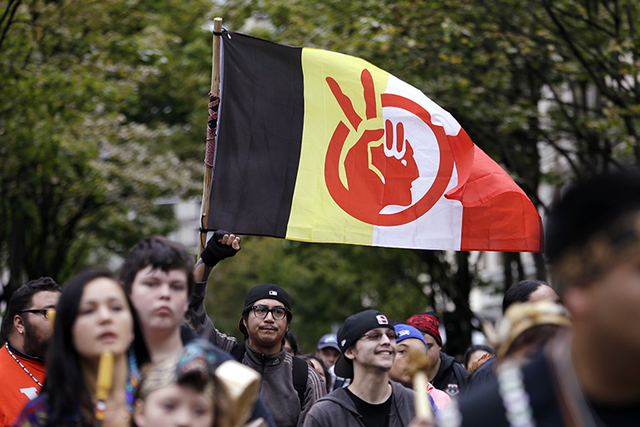Goodbye, Columbus Day; hello, Indigenous People’s Day
A growing number of communities are now ditching the traditional Columbus Day holiday in favor of Indigenous People’s Day, which, supporters say, is meant to promote an accurate telling of the United States’ history and commemorate the resilience of its original inhabitants against European settlers.
On Thursday, Vermont Gov. Peter Schumlin signed an executive proclamation marking the second Monday of October as Indigenous People’s Day. According to the proclamation, the day is to recognize that the state “was founded and is built upon lands first inhabited by the Indigenous Peoples of this region,” an NBC affiliate reported.
The move came three days days after City Council members in Phoenix voted unanimously to celebrate Indigenous People’s Day, the Arizona Republic reported. It won’t replace Columbus Day because Phoenix already doesn’t celebrate that as a city holiday.
“It is important to acknowledge the original people of this land, and that is something that Columbus Day has completely contradicted,” Laura Medina, an Arizona State University student and activist, told the City Council on Monday, according to the Arizona Republic.
Also this week, the City Council in Denver, which observed Indigenous People’s Day last year under a temporary proclamation, made the holiday permanent after a unanimous vote Monday, according to Fox News affiliate KDVR.
Phoenix and Denver join at least 26 other cities across the country that will celebrate Native Americans on Monday, while federal and state governments observe Columbus Day.
The idea of celebrating Indigenous People’s Day was first proposed nearly 40 years ago, when a delegation of Native nations to a U.N. conference Geneva passed a resolution. Thirteen years later, in 1990, the First Continental Conference on 500 Years of Indian Resistance in Ecuador passed a resolution changing Columbus Day into a celebration of Native Americans.
Berkeley, California, and South Dakota became the first city and state, respectively, to replace Columbus Day with Indigenous People’s Day in the 1990s.
Cities including Seattle; Minneapolis; Spokane, Washington; Boulder, Colorado; Albuquerque; Portland, Oregon; St. Paul, Minnesota; and Olympia, Washington, did so over the next several years following calls from activists to honor indigenous communities and their history instead of Christopher Columbus.
The momentum, however, did not gain traction in some areas.
The Cincinnati City Council rejected a proclamation Wednesday that would’ve recognized Indigenous People’s Day over Columbus Day, after five of the council’s nine members abstained from voting, the Cincinnati Enquirer reported. A majority of the members who didn’t vote declined to comment about their decision, according to the paper.
Guy Jones, president of the Miami Valley for Native Americans, told the Cincinnati Enquirer that because of the defeat, Native Americans are again left out.
“There is a tremendous amount of ignorance and arrogance about our history,” Jones told the paper.
Columbus Day commemorates the arrival of Columbus in the New World in 1492.
However, many have said that Columbus’s discovery of America is a misconception in the country’s history. During four trips that started in 1492, Columbus arrived on the Caribbean islands now known as the Bahamas. He also landed on an island called Hispaniola and explored the Central and South American coasts. The Italian explorer didn’t reach North America, which by that time, was inhabited by Native Americans.
Still, Columbus Day is celebrated in many parts of the United States and is observed by the federal government.
Although Native American groups consider Columbus a European colonizer responsible for the genocide of millions of indigenous people, supporters of the holiday have argued that he was an important figure in Italian American heritage. A day in his honor celebrates “the beginning of cultural exchange between America and Europe,” according to the Order of Sons of Italy in America.
“After Columbus, came millions of European immigrants who brought their art, music, science, medicine, philosophy and religious principles to America,” according to the organization.
The first Columbus Day celebration recorded in the United States happened in New York in 1792 to honor Italian American heritage. In 1937, President Franklin D. Roosevelt proclaimed Columbus Day a federal holiday after intense lobbying by a Catholic service organization consisting largely of Italian Americans, the Los Angeles Times reported.

















